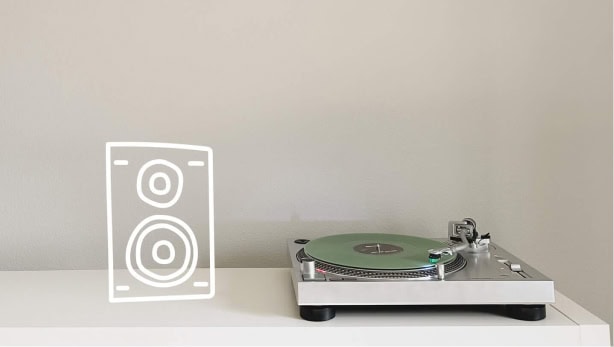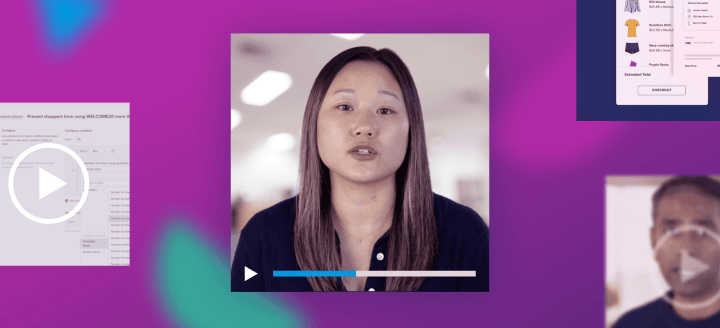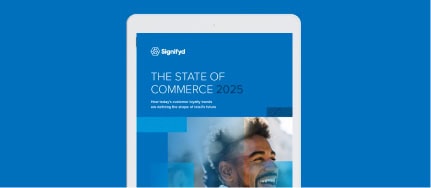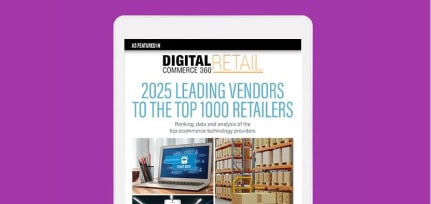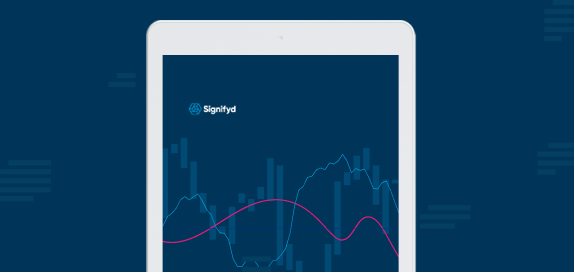Unleashing creativity and success in the fashion industry
Reviewed, revised and approved by Signifyd humans.
The genesis of a fashion icon: Rebecca Minkoff recounts the origins of her brand, starting from her early passion for craftsmanship and design, which led to the establishment of her globally recognized fashion brand.
At FLOW Summit 2023, Rebecca Minkoff, the celebrated fashion designer and founder, captivated the audience with her session, “Fearless: The new rules for unlocking creativity and success.” Minkoff’s journey in the fashion industry, her advocacy for gender equality and her innovative projects, including a collaboration with Roblox, provided a wealth of insights for aspiring entrepreneurs and fashion enthusiasts alike.
Embracing risks and overcoming setbacks: A significant focus of her talk is on the importance of taking risks and learning from failures. Minkoff shares personal stories of challenges she faced and how they shaped her career, emphasizing resilience and adaptability.
Championing gender equality: Minkoff highlights her efforts in advocating for women’s equality in the business world. She discusses her initiative, the Female Founder Collective, and its impact on supporting women entrepreneurs.
Venturing into new frontiers: The session also touches upon Minkoff’s exciting new projects and collaborations, reflecting her forward-thinking approach in the ever-evolving fashion landscape.
Fashion trends and business insights: Minkoff provides a glimpse into upcoming fashion trends and shares valuable business insights, showcasing her expertise in balancing creative vision with commercial success.
This session recorded at FLOW Summit 2023 offers a unique blend of personal narrative, industry insights, and practical advice, making it a must-watch for anyone interested in the intersections of fashion, entrepreneurship, and innovation. Watch it now.
Shape your ecommerce future at FLOW Summit 2024
Join industry leaders in New York City on April 17, for Signifyd FLOW Summit, an immersive experience designed to equip you with the resilience needed to thrive in the evolving retail landscape.
Dive deep into
- Actionable strategies to navigate, change, combat fraud and build lasting customer loyalty
- Engaging sessions led by renowned brands like Abercrombie & Fitch and Forrester
- Dedicated tracks for both ecommerce and fraud & risk professionals
Network with 350+ peers and forge valuable connections that will propel your business forward. Explore the agenda for a full breakdown of topics and speakers.
Don’t miss this exclusive opportunity to shape your ecommerce future. Register now!
TRANSCRIPT
Introduction and background
Ashley Kiolbasa (00:08):
Thank you so much. I am delighted to be here and honored to be hosting our last session of the day. This is a little bit of a surreal moment for me. Our final guest speaker is a force in the fashion industry. She runs a brand that I have known and loved for many years. She is more than just a fashion designer. She is a female founder and author, a podcaster, a human rights advocate, and a mother to four little ones at home as well. You already know her name. It’s Rebecca Minkoff. Yes.
(00:53):
Rebecca initially began working on her designs back in 2001. Her global fashion brand is now available online and in over 900 stores worldwide. Her products are coveted by cool girls everywhere. While her brand is most often recognized for its handbags, they also have a wide range of clothing, shoes, accessories, fragrances, home goods and more. What might not be so obvious to everyone in the room here today is that Rebecca’s path to success was not always an effortlessly chic stroll down the runway, but rather at many points, more of a grueling, sweaty hike. Through her journey, Rebecca has learned really she’s honed in on the recipe for success in business. She’s learned which rules to follow, which rules to throw out the window, and she’s learned she’s even rewritten a few of those rules herself. So she is here today to share her story with us. She is going to discuss her new book, fearless, and she’s going to share her advice for how we can all become fearless leaders ourselves. So please help me in welcoming to the stage. Rebecca Minkoff.
Rebecca Minkoff (02:25):
Hi.
Ashley Kiolbasa (02:31):
Hello. Thank you so much for being here. We’re so excited. I’m the most excited, but I think we’re all excited. So before we dive into your book, I want to go way back. I want to tell your story to the audience for those that are not familiar with it. So can you tell us a little bit about the origin of your brand and really how you got started? Yeah, so I got.
Rebecca Minkoff (02:58):
Yeah, so I got started. I fell in love with the art of craftsmanship and sewing design when I was eight. And it was just because I wanted this dress. I asked my mom to buy it for me and she said, no, but I’ll teach you how to sew. And I was really angry and upset and frustrated. Just buy me the $20 dress that’s hanging at target. But when she showed me how to sew, it unlocked for me something that I could have something in my imagination and immediately created. So I got pretty serious about learning the craft of creating garments and moved to New York when I was 18, I had an internship with a designer and fell in love with the idea that New York City fashion design, maybe I could have my own company one day. And so on the side, this was pre-social media or even anything online. And so I had a lot of time at the end of my day, I was very diligent in what I had to do and I would work on the side on my own five-piece collection. And I got it via my sister-in-law to an actress. She wore this T-shirt on Jay Leno. That was after 9/11. I had sent it to her before 9/11.
Ashley Kiolbasa (04:04):
Actually, we have a photo of that T-shirt too if you want to throw it up there.
Rebecca Minkoff (04:09):
Oh, okay. I can’t see what it’ll come.
Ashley Kiolbasa (04:10):
There it is.
The journey of the brand
Rebecca Minkoff (04:12):
So she wore that, and while it looks like this dumb T-shirt, Jay Leno said to her, who makes it? She said my name on national television, and I made that shirt every day for nine months. I’d go down to Canal Street on my bike, I would go up to my apartment, I would cut it up, bedazzle the heart. That was the extra cost. And it didn’t make me rich or anything other than people didn’t hang up on me. When I would call them and say, I have other things, can I come show you what I make? And so ecommerce was just beginning. I had one website that I would literally bike myself down to Tribeca, deliver the shirts, and she would sell them. And so that was a slog of four years of just trying to figure out how to make money, how to get my name out there, how to get into more stores. And then Jenna actually came back to me and she said, do you make bags? And I said, yeah, totally. I really do. And she’s like, cool, I need one in two weeks and it’s going to be featured in a film. The character’s always wearing the bag. So I had two weeks to get a bag done. That was the morning after bag. If you’re over 30, you probably remember that we brought a photo of that one too.
Ashley Kiolbasa (05:21):
Let’s show the morning after bag. There it is.
Rebecca Minkoff (05:27):
So yes, I can share how it got on Lizzie Lohan in a second. That was when she was pre her fall. So I had the bag made, it was delivered to set two hours late, they started shooting without it. And I felt like I had been punched in the gut and said, okay, well I’ll just wear the bag, see what happens. And enough women stopped me on the street asking about that style that I thought, you know what? I have nothing to lose by adding this to the line. Let me see what happens. And from there, a good friend of mine put it in her store in la. She then knew someone at Daily Candy, again, if you’re over 35, you know what Daily Candy is. And they wrote about it. And back then you wanted to receive email and you looked forward to what was in your inbox. And so for women to get the must have bag of the day just kickstarted this fuel and desire for this product that was affordable. It was timeless, but it felt trend, right? And it had a cheeky name. And so that was the birth of the brand as we know it today.
Ashley Kiolbasa (06:34):
And you recently wrote your book, fearless, which we have a copy of here. You all also have a copy in your gift bag if you haven’t opened that up yet. A fantastic read, highly recommend. But you wrote this book as kind of a guide or a new set of rules for unlocking fearlessness. Can you talk a little bit about just what inspired you to write the book in the first place?
Rebecca Minkoff (07:01):
Yeah. So pre Covid, I had this idea for a book that was really about new rules for success. And that there are so many risks that people never take because they’re scared that they’re going to fail. And so when I look back at sort of my career, every risk we took, whether it was a failure or not, helped us evolve as a brand and helped us to take the next step forward. And so I really wanted to share those learnings with people, whether they’re in the fashion industry or not. And then Covid happened and then our business exploded. And I hadn’t yet written, I had written the outline of the book, but none of the drafts. So I watched my business shrink by 70%. We had to lay off half our staff. We went down from a team of 60 to really, it was more than half our staff.
(07:50):
We went down to a team of 20. Everyone had to take huge pay cuts. And so we were essentially overnight an ecommerce company. Only all of our wholesale partners left us with about 25 million worth of goods. We had to figure out how to sell. And I took those rules and I said, this is what got me here. Let me see if we can reapply them today and find success. So every day was about applying these rules that we have in the book. And by no means did I do this alone. We had an amazing team that went on this journey. But I think in seeing it work again, I said, okay, here’s a proof of concept. You apply one or two of these things, you’ll find success. And so that was really how I shaped the book.
Fearless and taking risks
Ashley Kiolbasa (08:37):
And I want to read one line from the book that really just resonated with me. It’s when you’re talking about fearlessness and you say, let’s get one thing straight. Being fearless doesn’t mean you don’t have fear. It means that as you look head on shaking in your boots, you do what’s scaring you anyways. And this was just so powerful to me. I really loved this framing because it makes fearlessness feel so approachable to all of us. I cannot imagine a world in which I am going skydiving and about to jump out of the window. And I am not shaking in my boots, but I can imagine a world in which I do that really scary thing. Anyways, so would love to just hear from you. Can you tell us a little bit more about your thinking here?
Rebecca Minkoff (09:32):
Yeah, I think people see the title and they go, oh, by the time I read the book, I won’t be scared. Just like, oh, that’s easy. And that’s definitely not the intention of the book. The intention of the book is really about you applying these things makes you again do it anyways. You ask for the promotion, the raise, the risky project idea, whatever makes you feel fear. But you have these tools to sort of make it less. And then I talk a lot about fear. It’s doing these risky things is building a new muscle group. You get better at it, you get less scared. And for me now taking risks is a source of adrenaline. It’s an source of like, Ooh, what’s going to happen? And we have failed a lot. And so it doesn’t mean you’re always going to come out perfect, but you’re always going to learn something.
(10:17):
So how do we reframe failure? I am the first to say to marry my colleague in the audience, I was wrong. You were right. And then I go, what did I learn from that experience? It’s one, always listen to her. But two, it’s really about taking those things that you learned when you failed. That’s even more important than the success, right? Because you just get stronger and stronger and stronger and then it becomes less scary to take those risks that you feel are holding you back. And I don’t want to speak for all women, but I know women sometimes tend to feel like everything has to be perfect before I present, before I go out there. And I’m here to say, you don’t have to be perfect, you just have to go. And if it does fail again, what did you learn that makes you that much stronger in the end?
Ashley Kiolbasa (11:07):
I love that. And you mentioned one big challenge, which was the pandemic, but you talk about several other setbacks and challenges in your book as well. Can you share one or two of those and talk a little bit about how those experiences specifically helped to shape your thinking in your career?
Rebecca Minkoff (11:27):
Yeah, so early on we couldn’t afford quality control and we were working with our first big overseas factory and I was like, they have qc. I don’t need to worry about it. They make for Kate Spade and Tory Birch, muckle Kors. And we had quite a solid fan base community that would talk about my bags on this particular blog daily. And one day I came across it and I found out I had a, which was Quebeca Spank off, which is the hybrid of Kate Spade and Rebecca Mankoff. And I was like, why are they doing this to me? This is so mean. And as I read further down the forum, it was because my bags had shipped with Kate Spade hardware on it, both logos. So when the bags left the factory, it had a hybrid. And to be in major retailers like Saks and Neiman Marcus and Nordstrom and have to call those buyers and say, so we have kind of a problem, all the bags we just shipped, you have both designers names on the product and then have to recall that back.
Advocacy for gender equality
(12:30):
I ended up saying, you know what, it’s Willy Wonka. And I said to all these women that were my most diehard fans, I said, congratulations, if you find one, we’ll send you a new free bag. And what did we send them? Another hybrid bag because again, no quality control. So it was a pretty mortifying experience. Twice I thought it was going to put us out of business, but they all got their free bags. We corrected it in the end. But just what I learned from that is sometimes there are no shortcuts and if you don’t have quality control, well, I should have gone overseas and checked the production myself. But also we turned as much as we could this moment into something that wasn’t as terrible as it could have been. And we’ve had many of those. There was a big Twitter failure during a fashion show and we thought it’d be so innovative to have a live feed up of the show and the hashtag started trending and we started seeing nude images on the screen during my fashion show that we couldn’t take down. So that was an awesome moment as well, that thank God was my brother’s idea, not mine. So I was like, if this had been me, you would’ve killed me, but I’m just going to be calm and pretend that nothing happened.
Ashley Kiolbasa (13:43):
So you say though that the ability to face major failures and not totally fall apart was not something that necessarily came easily to you. You had to fail many times to really get good at failing. What do you mean by that? What does being good at failing look like?
Rebecca Minkoff (14:06):
I think the minute what’s happening, that pit in your stomach you want to throw up, at least that’s how I feel is okay, I’m feeling this anxiety, I’m feeling the failure, the shame, the embarrassment, whatever it is, it didn’t work. I thought it would. And then I sort of look back and say, okay, what could I have done better? Who could I have listened to differently? How do I take this learning and for the next time prepare differently or think differently or do my research? And I think when you have that moment and you internalize it, and then if you are leading a team, it’s really important to say, I was wrong. You were right. And I think them seeing you as a leader own up and take the responsibility for whatever didn’t go is the best thing that I’ve found you can do. Because they go, okay, she’s not perfect. She’s not blaming this on other people. She’s taking this for ourselves. And I think the respect and the camaraderie that can grow from that is more valuable than sometimes we think it is.
Ashley Kiolbasa (15:05):
Yeah. Now I want to switch gears and dive into the book specifically. So you have 21 very actionable rules or strategies outlined for readers. I want to dig into a couple of those. So the very first rule that you have outlined is an instruction to your readers to sign their own permission slips. What do you mean by that?
Rebecca Minkoff (15:34):
I think that sometimes it would be really nice if people came to us for everything. Oh, you look like you should get a promotion. You look like you should get a raise. Oh, you look like you need to get more sleep because you have a new baby. No one’s going to do this for us. The cavalry is not coming. And so you need to take the onus on you to really say, I’m giving myself permission to ask the tough questions, to stick my neck out, to be daring and go beyond what I am comfortable with. And I think that not to get too deep, but any great change has been someone sticking their neck out and doing something extraordinarily uncomfortable that no one gave them permission to do. And so I think you have to say, okay, no one’s coming. Anna’s not coming to recognize me as the best designer in the entire world. Screw it. I’m going to keep expanding and get the great press and get the great partnerships, and I’m not asking and waiting for that permission to be bestowed upon me.
Female founder collective
Ashley Kiolbasa (16:35):
I love that. And you also instruct readers not to ask for help, but to ask for what they need. Can you elaborate on that one a little bit?
Rebecca Minkoff (16:45):
Yeah, I think we’ve all come across the email. Can I just pick your brain? Can we just get some coffee and get your advice? No, I think that busy people and people that are great at their jobs don’t have a lot of bandwidth and a lot of time. And the best thing that you can do is just be so specific about what you need. So if I get something in my inbox that’s like, I need to know the best leather supplier, vendor, factory, great, two minutes done. I’ve helped you more than you sitting down and being like, so how did you get started? Or tell me about your story. There’s nothing that’s helpful about that in terms of actionable items. And so the more, if you have someone in front of you, whether it be a mentor or someone you need something with, just get really granular and really specific. And I think you’ll find that you get a lot more from that and cut the small talk and just go for the jugular and ask for what you need.
Ashley Kiolbasa (17:39):
Fearless also touches on issues related to gender equality and challenges that women are still facing in the workplace today. What do you think needs to change in order to create a more equitable environment for women in business today?
Rebecca Minkoff (17:59):
I think a lot of things, we’d be here all day. I touched on it earlier that we have to stick our neck out. So women getting the right to vote meant that they had to march, they were jailed, they were beaten. Women to have a credit card approved had to really stick their necks out. So this isn’t going to be a comfortable push. We’re not able to sit back and hope that John recognizes us. We are going to have to go to HR or go to our boss and demand more demand equality. If you have the same role and experience as someone else, it involves sharing with other women. What are you making? And maybe other men what got you the promotion. And then having that knowledge and uniting and helping each other or spotting a woman who should be in the room and saying, you know what? I’m going to bring her in the room with me. She needs to be here to learn this. None of this is easy or comfortable. It’s going to involve both men and women, sort of being the person to pull you in, notice someone that might be in the corner that might not have the confidence. And then having those uncomfortable conversations. And I don’t see it changing otherwise because I think until it gets bloody and ugly, that’s where the change comes.
Ashley Kiolbasa (19:16):
So you have also actually taken some action. You’ve founded the female founder Collective. Can you tell the audience a little bit about that?
Rebecca Minkoff (19:26):
Yeah, so I think 2018 was like Women’s History Month. I was on a zillion panels. We were all talking about gender equality and the pay gap, and it’s going to be a hundred years until we make the same amount. And I would get off stage and ask the other women, did this change anything? Did someone in the audience have an aha moment from this and go like, oh, now I’m going to pay the women? Well, and I don’t think that that was happening sadly. And so for me it was like what is the most direct path to make women wealthy? It’s women founders being armed with the tools they need to succeed in their businesses. And it’s also about other consumers knowing where and how they can purchase women-owned products. So we had sort of a three-pronged approach, which is education, a recognizable symbol and seal just like you turn over the back of your packages to see if they’re organic or vegan, and then community.
Exciting Projects and Fashion Trends
(20:19):
And so really launched without a strategy or a plan for it to become what it has today. But really proud to say we’re 20,000 women owned businesses strong in the United States. We have an incredible community and platform where these women are sharing their trips, their tricks, tips, resources, and then we’re constantly serving them to say, what do you need help with? Is it all the unsexy stuff? It’s not how to take a selfie or it’s what CRM platform are you using? How do you fundraise? We have cohorts that have gone on during the pandemic. We had a cohort of over 50 women known businesses that have now fundraised over $20 million. So we’re teaching them all the ways that they can succeed. And my hope is that if that founder succeeds, she pays her women equally. Let’s hope she reinvests in her community and she enables more job growth for other women to succeed in a different environment that could be more supportive.
Ashley Kiolbasa (21:18):
So we don’t have a lot of female founders, I think in the room today, but we do have a lot of the most amazing ecommerce experts in New York City. Yes. Is there any way that they can get involved?
Rebecca Minkoff (21:31):
For sure. So we have a bunch of events that we do, whether it’s weekly on Zoom or yearly that we need experts to speak in. And so that’s where we pull in people that are not founders to do these 90 minute immersive workshops on, again, incredible strategies, ecommerce, you name it. And then we recently launched a mentor platform called the North where a woman who doesn’t have to be a founder can book a session with you. You get the money. We think women should be paid for their time and advice to just pick your brain on whatever they need. So it’s that one-to-one experience that anybody who’s not a founder can either join and then the expert is the advisor. So if you head on over to Female Founder Collective, you’ll see all the links and all that stuff.
Ashley Kiolbasa (22:21):
Awesome. And I want to switch gears a little bit now to talk a little bit about what’s next for Rebecca Minkoff the brand. So all day today we have been discussing revenue generating strategies. We’ve been talking about robotic process automation chat, GPT payments and fraud detection, return optimization, et cetera. What are some of the maybe recent or upcoming projects that you are particularly excited about?
Rebecca Minkoff (22:51):
So if you have a young one at home, we just recently did a Roblox collaboration, I’ll say. So my son thought I was cool. Finally, he’s like, mom, all the kids are talking about your Roblox collection. So we wanted to see what it would look like to sort of get in front of that consumer. We did an activation last year where we had 40 million plays on one of their most popular games. So we figured there’s an audience there that definitely likes Rebecca Minkoff. And we’re kind of gearing up for an activation this summer in the Hamptons, kind of looking at what would a week long experience into the world of Rebecca Minkoff look like, and then fashion week, which is TBD, but we’re going to do something fun.
Ashley Kiolbasa (23:36):
Okay. And on the other end, the flip side of that question, what’s one eCommerce trend that you think is a little overhyped,
Rebecca Minkoff (23:45):
An ecommerce trend that I think is overhyped. I mean, this is really personal to fashion brands specifically. So I don’t know if out there got
Ashley Kiolbasa (23:57):
A few of those out there.
Rebecca Minkoff (23:59):
So we were paying a lot of money to have the sizing what the bag looks like on a model, and then we were like, we can just shoot this ourselves. It’s really silly that we’re paying a company to put it on a model, and we just think it looks better when we do it instead of the shadow with the bag. So I think that sometimes your tech stack can get so thick with all these different companies that we were trying to just lean it out and that was one that had to go away.
Ashley Kiolbasa (24:27):
Hot take. Love it. And I have one more question for you, and then we’re going to switch gears and open it up to the audience for a couple of questions as well. Maybe the most important question of the day, what fashion trends are you looking forward to for summer?
Rebecca Minkoff (24:45):
Ooh, this is tough. I’m three months out from having a baby, so I’m just looking for something that I can wear personally. Flowy. We love flowy, but flowy, flowy loose. But for anyone else who hasn’t just had a baby, I think skin is in and bear it all. It seems like people are just naked. So enjoy it, not me, but you all enjoy it.
Ashley Kiolbasa (25:10):
Love it. Here for it. Okay, so we have someone, Stu is going to run around with a microphone. Alright,
Stuart Gold (25:20):
Raise your hand for a question for Rebecca. Here we go. Right here.
Rebecca Minkoff (25:24):
And you don’t have to be shy, as you can see. Pretty open.
Audience member (25:28):
Hi. Hi. Thank you so much for that. That was amazing. So when you’re thinking about leather bags specifically, that’s a higher price point, right? How are you effectively driving up retention when it comes to a higher priced item?
Rebecca Minkoff (25:42):
So believe it or not, most of our, I would say the last couple of months we’ve been slowly introducing higher priced items that we were a little uncertain what would happen. And those are the items that are selling the best right now. Even we sell on QVC and their price point, their a UR is very low. And we went out there with a bag that was 3 48 and that sold the best as well. So we’re not seeing our customer sort of push back. I think what we’ve done is we’ve done an excellent job at always making sure you have your 1 95 bag. That is the opening price point for this brand. And we’re just beginning to stack on more and more expensive and we’re testing to see how far she can go. And there is that customer, right? She’s older, she’s in her second or third job, she’s making more disposable income. And so we’ve seen that area be the biggest source of growth for us right now. It just has to have that value. It has to have all the studs or the more expensive looking leather and then she goes for it.
Audience member (26:42):
Awesome. Thank you.
Stuart Gold (26:44):
Anyone else? Oh, I’m coming. Excuse me. This is my Oprah moment. You get a car?
Rebecca Minkoff (26:53):
No, I was going to say you get a book and you get a book.
Stuart Gold (26:55):
Who had a question prior?
Jordan (audience member) (26:58):
Hey, you doing? My name is Jordan from the Snow Agency. Just a quick question. So for a brand like yourself that’s had a lot of success, you said yourself, you started in store and then moved online. What is the one thing you think you could improve upon from your online business perspective that you think could require help from an external party? So I know a lot of times people go into these things with the mindset of I think this will work, and then they talk to somebody then that somebody says, you should look at this. This is an opportunity that other people are seeing. So what’s the next big step, I guess, for your company in that way?
Rebecca Minkoff (27:30):
I think for us, and it’s a long time overdue, so for many years, just to put it in perspective, pre covid, most 70% of our business was wholesale. So we focused on our ecommerce. But every day we came into the office and said, how did Nordstrom do Sachs a sell through rate? And what did the buyers like? And we were beholden to these companies when all that went away and we just had our site, that was the first time we focused on what do we do today? How much more do we need to do tonight to pay the bills? And so I think that we still need to catch up to the customer service, if I’m being really honest with you, part of our ecommerce, the packaging, the look and feel when you open the box, what it should look like. We’re not there yet and we need to be. And I think, I don’t have any excuses other than it’s just been a little bit slower to prioritize that and invest in that. Like, hey, we don’t have any money right now because the world and supply chain is in disarray, but we need to get nice pretty boxes and all that stuff. So I think that’s our next phase is the packaging, the customer experience and the customer service over here.
Audience member (28:44):
Hi. We talk a lot about technology, how that, this is why we’re here. Obviously talking about technology and how that’s helped your business, but there’s so much about you as an entrepreneur that within your soul and your grit that has nothing to do with technology and has nothing to do with ecommerce and how your business has gotten to where it is today. I would love to know what are some of those underlying values as a business woman, as a leader that you, I mean you’ve talked about it a little bit, but that you still feel like despite the times changing and the landscape changing is still the most important thing to you in terms of your business practice and yourself as a leader?
Rebecca Minkoff (29:33):
Yeah, I think humility, gratitude. I think that we have always done everything we could to stay with our customer and where she is from an economic perspective. So my bags when I launched were 5 95 and 4 95. Then the recession hit. And that was considered affordable by the way, pre 2008, the recession hit and we had dinner. It was like a celebratory dinner with sacks, and they said, if there is a five or a four in front of any of your bags, we just don’t think that she’ll be able to afford it anymore. And so we took a haircut and our bags became 2 95, 3 95, then we pushed it and did 1 95. We didn’t know how to make money off of those price points. In fact, we didn’t. We barely broke even. But we knew that she no longer had that disposable income. And so we said, you know what?
(30:31):
We’re going to sacrifice any profit really in order to make sure that we don’t lose our customer. And I watched the brands that we were just trying to barely reach what their volume was, and none of them are around today, zero. And we are the only ones that emerged from that. We grew 548% over three years because of that. So I think listening to her being humble, being gratitude, and then sometimes just you sticking it out is the only reason you’re still around. There have been so many times, and I can’t share the stories with you, where we were like, oh, today is the last day. Let’s just pack up our stuff and be done. We had a lot of those days during Covid because just because we lost 70% of our business didn’t mean that our vendors didn’t want payment. And so it would’ve been easy to go bankrupt and to be like, well, we tried. This was great. And my brother and I, he’s my co-founder, we would just have these calls late at night. We can’t give up. We owe it to the team that’s left to not give up or to the 17 years of slugging through this to not give up. And so sometimes just the fact that you just showed back up ensures your success.
Stuart Gold (31:46):
We have time for one more, right here.
Audience member (31:49):
Hi. I have a question. We just had a great session about international expansion. So what about you? Did you experience any growth pains while expanding internationally? Are there any anecdotes or fun stories you can tell us about?
Rebecca Minkoff (32:03):
Yeah, you need a lot of money to expand internationally. When we go international, we’re now reentering or trying to reenter the space. You’re competing with brands. I’ll just be honest, Tory Birch, Michael Kors who have tens of millions of dollars for the billboard and the marketing campaigns. And as a small business, how do you stand out to an international market who has the Euro in their favor? They have great European brands. Why are they going to buy you? And I think you need a lot of money to tell that story and to get in front of the consumer. And so as we’ve been talking about relaunching overseas, I’m like, do we have the money to do this right? Because I’m not going to go have a little podunk dinner party with the editors and think that we’ve now internationally cracked it. So I think that it takes the funds to do it right and to keep messaging to that consumer why they should buy you above every great European brand. So it’s not easy, and I don’t have the greatest of advice yet. We haven’t relaunched there, but next year is the plan to really go big there.
Ashley Kiolbasa (33:13):
Awesome. Okay, I think that’s all we have time for today. But Rebecca, thank you so, so much. Thank you. This has been wonderful. We really appreciate your time.


